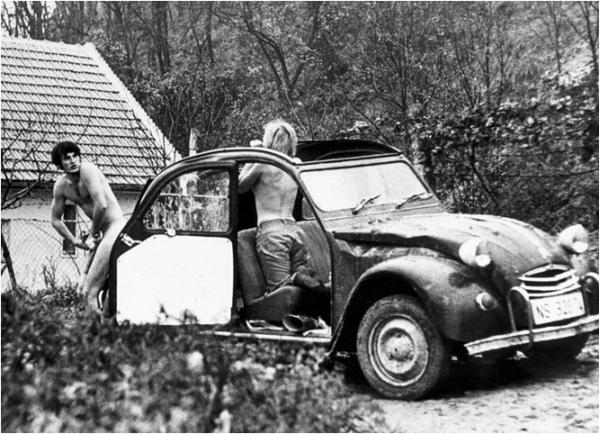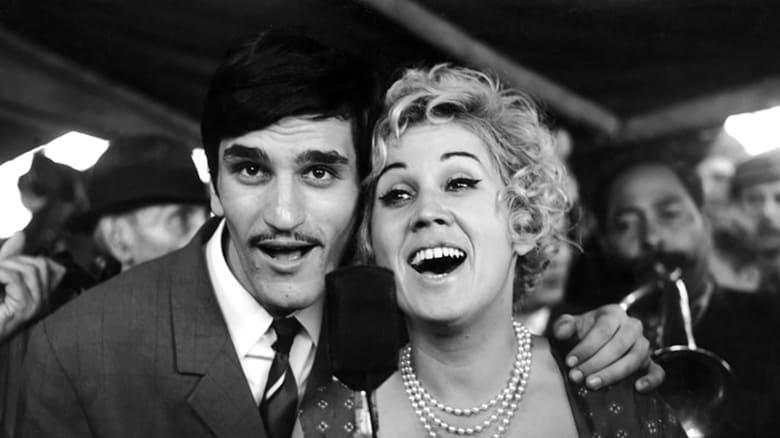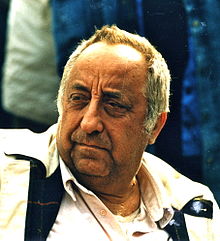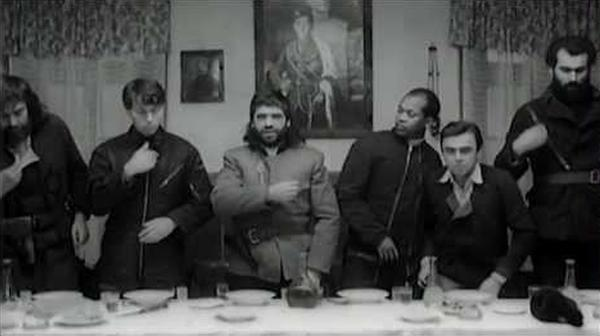
Can I create a thread and an intro to the Yugoslav Black Wave by glossing over the key works? Yes, I can.
And no, it is not subversive, it is merely laziness. Over the last 2 weeks, I have gone on a deep dive this exciting rebellion, and these are write-ups and thoughts on the films I'm seeing for the first time.
It has been (and will hopefully continue to be) interesting to see just how subversive can could be before you get banned, and either thrown out of the country or the industry - and to observe just how the critiques were levied and disguised.
Honestly, the Yugoslav Black Wave is undoubtedly one of the bravest and most subversive film movements in the history of cinema - and through a shockingly long and successful output they manage to throw not just subvert, obscured and abstracted critique - but firebombs in the faces of the censors.
The movement is unified by a shared lack of optimism, and breaking down the facade on the world they lived in - painting instead a picture of restless or anguished youth, despair, criminality, corruption and oppression.
Due to the breadth of cinema present, I decided to dive down into the film that gave the movement its name, as well as the film often cited as starting it all, the 3 filmmakers involved.
Interestingly, the most known names of the movement, Dušan Makavejev and Aleksandar Petrovic, were involved in neither event - and as so much has been written about Makavejev in the past (and honestly, because it is such a long time since I saw these films) he will not be included - but I did seek out the works of Petrovic that I had not yet seen as well.
Anyhow, here we go.
Rani radovi / Early Works (1969, Zelimir Zilnik)

Early Works was, shockingly enough Zelimir Zilnik's debut, and he would never be allowed to make another film in Yugoslavia.
Upon seeing his work, writer and journalist Vladimir Jovičić called foul with an article titled "The Black Wave in Our Cinema" - citing Anarchistic under and over-tones emerging over the last decade - and with that, the gig was up. Things started to changed - and the label started to be applied to films and directors in both a positive and negative way.
So, what about the film itself?

Early Works has phenomenal energy and feels like a raw mixture of Jakubisko's Birds, Orphans & Fools coupled with Godard's political work. It is black and white, and clearly low budget - but with quotes, chants, play - not to mention political slogans pushed in intertitles - it feels like a film very much of its time - if not ahead of it.
Its revolutionary protagonists are jesters, playing, shooting blanks, staging scenes - nothing is as it might seem - and you rarely know what is intended for jokes and what has more serious overtones. While very rough around the edges - it really delivers, and had it not been for the ending (and some of the other treatment of the female protagonist) leaving a bad taste in my mouth I may have proclaimed it as great - THOUGH - this is also a film it is really hard to dissect - and get a good read on.
Our female lead - Jugoslava - is likely standing for Yugoslavia itself - and it can be hard to see the exact mean and intention of each scene and acting - leaving this as a film I'd cautiously recommend to anyone interested in the Black Wave. 7/10.
Grad / City (1963, Marko Babac, Zivojin Pavlovic, Vojislav 'Kokan' Rakonjac)

Grad opens with screaming, yelling drama as a man, close to the camera, holds up his arms and argues - before running - literally running into the city. It is dramatic, and we're hooked. The rawness of it gets us.
This is the opener of Vojislav 'Kokan' Rakonjac's "Love" - the first of 3 stories comprising Grad - and in my opinion the strongest - showing a collapsing relationship, with a cinematic drama. Marko Babac follows up with a more low-key hangout in a room, with nowhere to go - and strong hints at decay - while Zivojin Pavlovic explodes in a near plotless exercise in city-wide rustling.
The unified voice is clear - especially in retrospect - something is a little wrong ... but it was quiet enough about it to get past the censors. This is a good quote from a review I read recently:
And with this, the black wave had (potentially) unofficially started (by some counts).
*City is actually the second omnibus film created by Marko Babac, Zivojin Pavlovic and Vojislav 'Kokan' Rakonjac
Vojislav 'Kokan' Rakonjac
Kokan Rakonjac only got to make 6 solo features before his early death in 1969. He was only 34 years only.
His deaths seem to me to a great loss, as the degree of creativity, both in plotting, structure, form and visuals he brought to the medium is thoroughly impressive.
Even in his opening scene in Grad it is his cinematic tension that grabs us, and this degree of power only continues.
Nemirni / The Naughty Ones (1968, Vojislav 'Kokan' Rakonjac)

The Naughty Ones is a surprisingly vague and clever mystery that simply loves playing with our minds, while also delivering fairly clear systematic critique - and getting away with it.
We open up with an accident - a man is screaming, calling out it is not his fault - and we feel the exact same degree of cinematic power and prowess as in Grad. The film opens up to us, grabs us with its intensity - the blood on the street - the police - and the look for the car that sped away.
But this is not where it gets interesting: The car stops, a woman leaves the car and will "call her father" to clear it all up - we only see her legs - that's all - and when chaos ensues, the car is "stopped" and they realize someone is missing - there is a frenzy to figure out who - and here, the film chooses to play with us.
We are presented with potential candidates, each with their own stories, and all trapped on the road going in one direction - away from the police - and without knowing who they really are - and who is truly connected to who we start to see the three journeys, combined with the police investigation, which creates a beautifully vague portrait that showcases clear class differences and clear differences in power - while keeping the mode stylistically clever and playful throughout. 8/10.
Pre istine / Before the Truth (1967, Vojislav 'Kokan' Rakonjac)

Dreamlike and visually stunning - at times almost experimental - Before the Truth draws together a simultaneously complex and vague net of unknown actions and ties as a disgraced party official is ushered through an increasingly strange journey - ending with an encounter with a man he was meant to execute during WW2.
I don't want to throw around this comparison lightly, but it almost has a sense of Last Year at Marienbad - with our two characters having widely different interpretations of the past - and a present that almost seems to fold over itself - to the point that you can even question what is real - and what we are meant to look at.
Massive protests, seemingly about Vietnam, rage in the streets, while our leads are slumming it in strip clubs, meeting hookers, fighting in bars and streets - never quite sure of what the relationship between them will truly be - their intentions, and what is the actual target. Is our lead, for instance, the very being of Yugoslavia/the communist party? Are these two men really different? Is one better than the other? While ending on a somewhat slight note, this is a film I'm quite likely to revisit, and it has so incredibly much to offer, and perhaps even more to be uncovered. 8.5/10.
Marko Babac

Despite being so tied to the origins of the Black Wave, Marko Babac ended up only managing to make one solo feature and is because of this considered a minor figure of the movement.
He would continue to be involved in the film industry as an editor - but the below film was the only work he was allowed to create on his own.
Ko puca otvorice mu se / Shoot and It Shall Open (1965, Marko Babac)

Marko Babac's solo debut takes on youth delinquents, with an overt sense of ease and play. We follow three youths, two men and a woman - the latter being the daughter of a high ranking party member, the men being low-level hoodlums.
It has a similar energy to the early Godard and Truffaut films, not to mention the early youth delinquent part of the Japanese New Wave. A kind of restless, aimless youth that simply exist - with no clear motivation - with added fun/play coming from the fact that our trio is mainly hanging out and speaking in quotes, rhymes and jokes.
It is well shot and in surprisingly good condition compared to most other black wave films. It has an interesting view on power structures, where the police are actively attempting to shelter the girl until things go too far - and it sneaks in this power dynamic is such a light way it slipped through the censors. The overall idea of restless youth is also light enough to not be seen as overly critical.
It feels somewhat slight and easy in terms of themes and storytelling, but it has enough to offer in play and creativity to be thoroughly enjoyable. 7/10.
Zivojin Pavlovic

Zivojin Pavlovic is possibly the bravest of the Yugoslav Black Wave filmmakers, and while films got censored his career was not only the most prolific, he was one of very few members that did not emigrate to the west.
His likely bravest film is Red Harvest, which sadly got banned, but had the guts to show a communist official forcing and even murdering in the name of collectivization - and have this as its key plotline - the key to attempting to get away with it being that he was acting on state pressure to get this done rather than state orders to break the law.
I have also previously seen his strong and bombastic Ambush, which showcased the brutal, unflinching and immoral/amoral acts and behaviour of those fighting against the nazis - and that it is not necessarily the heroes that would go on to better things - far from it.
I loved neither film, but both are good, and in this set of 4 I could see his bravery on far clearer display.
*It is also worth noting that while he never went into exile, the result of The Ambush was that he was sent from Serbia to Slovenia, leading to Red Wheat and later productions being in Slovenian rather than Serbo-Croatian.
Neprijatelj / The Enemy (1965, Zivojin Pavlovic)

I think it speaks volumes that when Pavlovic adapts Dostoevsky we open with a premise more similar to a reverse Lulu the Tool - with an overly idealistic worker living for the work and his principles - a mentality only overridden by an interest in the bosses' daughter.
Pavlovic's character has lost touch with most around him - his friends think he does not know how to live - and the idea of the life of the worker giving himself to the work rendering life meaningless is strong throughout - even as the more psychological and trippy overtones of the double start to mix in. It is bleak, yet darkly comedic - and while it feels a little underdeveloped all the individual elements work quite well. 7/10.
Povratak / The Return (1966, Zivojin Pavlovic)

Slightly rougher than mot of Pavlovic's other films, and only clocking in at the hour mark, The Return follows "Al Capone" - an old gangbanger shipped off for 6 years and who may or may not want to turn straight. Once again it is a world filled with crooks, and here the existential anguish is turned up several notches - with one of the most horrifying sequences being the new "Al Capone", putting fire to the saddle of a horse just because he can (don't worry, no actual animal abuse as I could tell, but it threads the line in our mind).
It is rushing through the numbers, certainly, but this raw world certainly kicks in the face of the country Yugoslavia wanted to be - and looks at the cycle of criminality, and how there really doesn't seem to be any end - mixed in with despair and melancholy. While a little slight, if only due to its length, it still packs a decent punch and was a good viewing. 6/10.
Budjenje pacova / The Rats Woke Up (1967, Zivojin Pavlovic)

The Rats Woke Up steps up the darkly comedic undertones present in Pavlovic's previous films and enter Coen brothers territory in its tale of a middle-aged man haunted by his past. This is a world where everyone is a "snitch" - to the point that they introduce themselves as one - and where a criminal underbelly is rampant. It feels far more cinematically polished than his previous work and takes absolute delight in painting awkward situations. A fun, strong romp. 7.5/10.
Kad budem mrtav i beo / When I Am Dead and Gone (1967, Zivojin Pavlovic)

Now, this is something else! (and the key inspiration to Midnight Cowboy)
When I Am Dead and Gone is not only darkly comedic, it is extremely raunchy and kept subverting all expectations.
We open with absolute poverty as workers are ushered away after a job is completed - there is no stability, no jobs and no hope. Our lead, Dzimi, dragging a potentially pregnant fiancee (possibly not his child) with him takes us across a dark Yugoslavia - where only tricks can get you by.
Yet, it is not as miserable a film as you may at first think - and through a series of "lively" encounters Dzimi ends up styling himself as a mediocre singer - even going so far as to enter a singing contest. The tempo is high, and we fly from scenario to scenario, encounter to encounter as our anti-hero wanders, wayward but with aims, however intangible. It feels utterly irreverent, clashes with decent etiquette and is simultaneously darkly hilarious and crudely bleak. 8-8.5/10.
Aleksandar Petrović

Aleksandar Petrović may not have the cult status that Makajev built for himself with later films like W.R and Sweet Movie, but during the 60s he was the most respectable name of the Black Wave, enjoying consistent International praise.
He was frequently competing for the Palme d'Or and his two most recognized films, Three and I Even Saw a Happy Gypsy, were both nominated for Best Foreign Film at the Academy Awards.
He was denounced by the Communist Party in 1973 and just as Makavajev he had to find a career in Europe - but with much less success.
Dvoje / And Love Has Vanished (1961)

Dvoje is the solo debut of Aleksandar Petrović and predates the general start dates of the Black Wave - though, interestingly, it does offer an alternative origin story - one coming from a very similar vein as that of the French New Wave. Petrović shoots on the streets, mainly at night, and while the sound can be a little rough, he creates great atmosphere as the somewhat thin romance starts to unfold. Is it critical of the conditions in Yugoslavia? Not overtly. It focuses in on the fleeting sense of love and is truly just a dark romance story - though one that enjoys showing that it is merely an echo of a society looking for love. We also get the wayward/restless youth - but it does feel smoother and less confrontational than what we see from the other directors - possibly even of a "different class" - not concerning itself with poverty - but plays and cafés. A very interesting, but slight start for Petrovic. 6/10.
Dani / Days (1963)

Days climbs closer to the tension and focus of the Black Wave and refreshingly switches the focus from wayward men lost in fulfilling lives - to a woman trapped in the same situation. It is a very fitting follow-up to And Love Has Vanished continuing the New Wave aesthetics, but with greater production values and even more striking images.
From the very beginning, we enjoy great long shots, often looking down at people, even masses of people - we also get street views not too dissimilar to those of Dvoje - and far more expressionistic shots and sequences that may just blow you away - most impressively a long car ride on a runway that focuses in on our protagonists' hands in the light - a spectacular sequences.
The plots of Dvoje and Days are quite similar, a woman, already in a relationship, strikes up a new romance, and we spend a few days with them as the passion grows. The films are so close that at one point they stop in front of literal posters of Dvoje, with our protagonist dismissing it as a "tea-boiler" - and by comparison, it is. Days is a far more mature piece, allowing our lead far more character - and letting her carry us into her life - while the romance and especially visual energy comes across as far more striking. It still feels just a little slight, but a wonderful step up. 7/10.
It is also where Petrović appears to learn the value of intersecting action with music, a relatively unique trait he would clearly develop more later. 7/10.
Bice skoro propast sveta / It Rains in My Village (1968)

It Rains in My Village is a fairly mean and nasty film, that borders on poverty porn, and keeps wanting to poke you with its brutish nastiness - complete with a band of comedic travelling players - singing sarcastic songs to the actions of the villagers. And frankly, it works brilliantly. If you enjoy mean films - check this one out!
It is impressive that it not only managed to intersect this village's immorality with literal Yugoslavian flag-waving and patriotism - as direct contrast - and even worked in the Soviet invasion of Czechoslovakia in 1968. Events happen around our village - but do they care? Do they even have the proper agency to care? Have their lives been lifted by the Yugoslavian regime?
The actual plot concerns a swine-herder, who essentially gets put on the spot into marrying a woman seen as the town fool. Nasty, from the beginning. Well, actually, the film starts with our Travelling Players coming in, and their female singer being sent away because the town doesn't need a woman to sing. Lovely! Anyhow, this "idyllic" state is uprooted when the new teacher comes to town, and even more so when a pilot crashes into a three. With sex, "love", cheating, jealousy and more on the line - and our toothless, jeering players singing away - this film is only headed one way - as the players repeat again and again - doomsday (and as they always say, "won't matter much anyway"). 8/10.
Majstor i Margarita / The Master and Margaret (1972, Aleksandar Petrovic)

The Master and Margaret feels like an utterly left-field decision, if not from Petrovic, from the state studio that supported the project - especially as it would end up as a prophecy - in more ways than one. History can be ironic! The tale is "simple" - that is the great state bureaucracy steps in to stop a master playwright from putting on a play that could be seen as criticizing power structures - which in turns could, of course, be seen criticizing power structures - and which in turn - well - Petrovic may not have shared the master's ultimate fate - but the parallels are one too many.
Even odder - it is a full-blown international co-production between Yugoslavia and Italy, with Ugo Tognazzi in the lead role, American turned European mini-sensation Mimsy Farmer as Margaret - and an ageing Alain Cuny as the devil himself - and may I see - frustratingly silly henchmen aside - he makes a phenomenal devil.
Oh, speaking of Italy - this is of course where Petrovic would make his sole exile film.
The film itself starts off strong, with a great focus on censorship with a magical realist twist - though as it progresses it does become a little more juvenile and empty. The presence of the devil almost becomes a symbol of justice, with the devil standing up to tyranny ... with more tyranny. It is an odd one, and feels quite wayward by the end - but consistently well made and shot - and quite a few fun and clever ideas thrown into the mix. 6/10.










